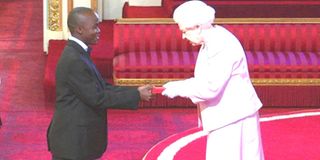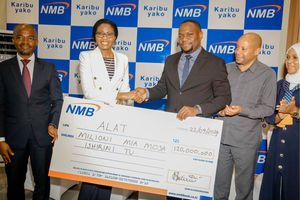When students use one platform for academics

Given Edward winner of the Queen’s Young Leaders Award, a recognition to exceptional young people. He created a platform for students to discuss various subjects. PHOTO I COURTESY
What you need to know:
The 23-year old Edward and winner of the Queen’s Young Leaders Award, an award by Queen Elizabeth II to exceptional young people, narrates that by that time he was living in Tegeta, Kinondoni Municipal,Dar es Salaam almost 27 kilometres from his school.
When he was in Kibasila High School for his advanced level education, Given Edward wondered if students would have a discussion forum accessible to them no matter where they are.
The 23-year old Edward and winner of the Queen’s Young Leaders Award, an award by Queen Elizabeth II to exceptional young people, narrates that by that time he was living in Tegeta, Kinondoni Municipal,Dar es Salaam almost 27 kilometres from his school.
Edward came up with MyElimu, a website that brings together students from all over Tanzania to discuss various subjects of both O and A levels plus other academic matters. And this is what earned him recognition by the Queen of England.
“I had already known enough about coding, a computer language which makes it possible for us to create software, apps and websites,” Edward tells Success from Mauritius where he is currently studying at African Leadership University (ALU).
“Initially the goal was to connect students but with time it has become bigger than that - into aiming to improve the quality of a secondary school student overall,” speaks the Founder and Director of MyElimu.
Given was born on August 5th, 1994 and was raised in an average extended Tanzanian family. He was born with a twin sister Gift whom he describes as his source of strength.
He did his O level education in Tegeta High School and A level in Kibasila Secondary School. He then went to the University of Dodoma for a year, before receiving a full scholarship to join African Leadership University (ALU) where he is currently studying Computer Science.
ALU is a non-traditional university with a mission to groom the next generation of African leaders, and it does this by identifying talents across Africa and giving them, in addition to normal degree programmes, students are also exposed to various leadership skills that would help them maximize their impact in the continent.
Edward’s vision is to help students become fit and ready for the 21st century kind of society and most specifically workforce.
“Almost 60 per cent of Tanzanian graduates are unemployable just because they are half-baked, this is what troubles me when it comes to education,” he says.
“So we know for sure the problem is not access to education, at least not for them.”
According to him, this may also translate to a logic that even if all children in the country get to go to school and get 100 per cent access to education, they’re still going to be half-baked and hence there’s still going to be challenges in realizing the set country targets and vision.
The current education model in the country, as Edward asserts, would be ideal 20-30 years ago, or even at the time of independence when Tanzania had only two engineers, and four doctors and education was aimed to create more and more of these kind of professionals.
“Students need not just to pass exams but also possess characters such as curiosity, be proactive, have social and cultural awareness plus persistence,” Edward points out.
“Now these cannot be taught in schools, they can only be influenced and equipped to them plus other set of competencies including critical thinking, creativity, collaboration and communication.”
According to Edward, these are critical skills that all employers desire in their employees and all successful entrepreneurs possess.
This is the reason why Edward had decided to set up a discussion platform at MyElimu.com where students can connect with others from different schools in different places and learn.
With this, Edward believes, they will be able to achieve two things: first, inspire collaboration among students, which is a skill they need to improve in school and in the workforce. And two, to make it easier for them to understand school content. This is based on the assumption that students learn best when they discuss with others.
“Our mission is to make learning content easier for students to access, understand and apply,” reiterates the young social activist. “Our flagship initiative MyElimu, is focused on making it easy for students to understand what they learn. Our next initiative, is to ease access to content.”
To use MyElimu.com, a student first visits myelimu.com or download the MyElimu app on their phone. On the homepage they will see a page where they can directly start a discussion. They will fill in the details of their discussion topic and subject and post it. When other students visit, they will see the discussion and participate.
A student can also just browse through the discussions to see what others have been discussing. On the homepage the discussions have been categorized by subject so it’s easier for students to find exactly the subject they want and discuss.
“On average, more than 15,000 users benefit from MyElimu every month. Our target is secondary school students in Tanzania, these if you exclude the visitors from outside the country,” says Edward on how the social enterprise has been effective in improving the country’s education sector especially to its target group.
The passionate social activist volunteered at the Tanzania Youth Vision Association (TYVA) and Youth of United Nations (YUNA) Tanzania where he was championing the agenda of youth development was among the recipients of the Queen’s Young Leaders Award.
He was given the award for his leadership journey and being the driving force behind MyElimu being acknowledged with the introduction of the new ways which students can use to learn better using the internet.
“It put me in a position where I’m able to impact and inspire more young people than before,” speaks Edward on the award. “On the other side it has also been a turning point for me in the aspect of how I conduct my activities and how I carry myself before the public.”
As a young social activist maintaining commitment and motivation paves a great challenge to Edward. “When you are just beginning, you don’t know as much about the field. So you dream big changes and take big swings,” he says. “The more you learn the more you realize there are a lot of moving pieces and that can be overwhelming to a point of thinking of giving up.”
But if it was easy, Edward talking to himself in such a situation, everyone would have done it. “So you need to keep going and not be that guy. The guy that gave up.”
Edward thinks that there are still areas for improvement in the country’s education advocacy with an emphasis focused on integrating tech in the education system though he acknowledges the efforts taken. He also insists on the skills that are highly demanded in the 21st century and which are on the demand list of all competent and first class employers.
“We need to encourage these to students and we can do that by embedding the current curriculum with content as well as a structure that fosters those characters.”
It may take time to change the status quo, says Edward meanwhile sharing his optimism that no matter how long it will take and how hard might it seem, he believes it can be done for the sake of the country’s present and coming generations.




